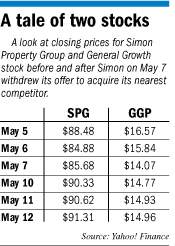Subscriber Benefit
As a subscriber you can listen to articles at work, in the car, or while you work out. Subscribe Now
Simon Property Group Inc. withdrew separate offers to either acquire General Growth Properties or finance its exit from bankruptcy
after a New York judge endorsed a rival plan that allows the nation’s No. 2 mall owner to stay independent.
So where does that leave Simon and the $6.8 billion war chest it has amassed to make a run at its nearest shopping mall rival?
The Indianapolis-based company probably will pay off debt and wait patiently for the next opportunity, which could include
buying a handful of individual General Growth malls after it emerges from bankruptcy, said analyst Rich Moore, who follows
Simon from the Cleveland office of RBC Capital Markets.
Simon couldn’t be much better positioned, with $3.6 billion in cash and $3.2 billion more available through a line
of credit. But now that a wholesale acquisition of General Growth appears off the table, Simon probably will look to opportunistic
smaller deals and to make a meaningful dent in almost $2 billion of upcoming debt maturities.
“There’s this notion going around that they have to do something very quickly but that is absolutely incorrect,”
Moore said. “I would be more leery if they went to do something else right away.”
 Simon
Simon
CEO David Simon has offered few hints so far about what he might do next. He said in a statement after the bid withdrawal
on May 7 that the company will find other ways to grow.
“We will continue to focus on our business and evaluate other opportunities in the marketplace as we always have: prudently,
in a disciplined manner, and in the best interests of our shareholders,” he wrote.
The real estate investment trust has grown rapidly since Simon took over as CEO in 1995, primarily through acquisitions.
But General Growth is not the first deal that hit a wall. The Taubman family in 2002 used a special class of stock to fight
off Simon’s $1.5 billion offer for Michigan-based Taubman Centers Inc.
If the situation with General Growth were a straight-up bidding process, Simon would have won hands-down, Moore said. The
company put together a superior offer, but General Growth’s Bucksbaum family snubbed it.
“If they thought bidding at a higher level would get them the assets, they probably would,” Moore said. “In
REIT land, if you don’t want to sell you don’t have to—there’s not much Simon can do with the Bucksbaum
family wanting control and having the ear of the court.”
It isn’t yet clear how much Simon spent in its pursuit of General Growth, but the number will be minor considering
the company’s size and likely will be offset in part by gains in General Growth bonds Simon acquired as it was exploring
a bid, Moore said.
If Simon were to acquire select GGP properties, that company’s Las Vegas portfolio including Fashion Show would make
sense. Simon already owns the top-performing mall on the Strip, The Forum Shops at Caesars Palace.
Simon’s strategy ultimately will depend on whether a retail turnaround continues to take hold. But even if it doesn’t,
Simon could get a second shot at picking up distressed mall assets.
“I wouldn’t say Simon is under significant pressure to use their capital, but it is expected that it will deploy
it, sooner rather than later, and definitely within the next year,” Jason Lail, a senior real estate analyst for Charlottesville,
Va.-based SNL Financial, told the magazine Retail Traffic.
Technically, Simon could still make another bid for General Growth. But it had promised to walk away if the bankruptcy court
approved the issuance of warrants worth more than $500 million to an investment group led by Canadian property manager Brookfield
Asset Management Inc.—a move that would have made a Simon acquisition pricier.
 That deal, approved May 7 by U.S. bankruptcy court Judge Allan Gropper in New York, cleared the way for General Growth to
That deal, approved May 7 by U.S. bankruptcy court Judge Allan Gropper in New York, cleared the way for General Growth to
emerge from Chapter 11 bankruptcy protection as a stand-alone company. Simon’s final cash offer was for $6.5 billion,
or $20 a share.
David Simon blasted the General Growth board, saying it “hastily decided in less than 24 hours to accept substantially
less value.”
Simon said the Brookfield-led deal values General Growth at least $5 a share less than its own offer when one accounts for
the warrants.
General Growth CEO Adam Metz said the Brookfield-led plan serves as an “insurance policy” for General Growth
because it gives the company the funds it needs to exit bankruptcy while at the same time allowing it to pursue other potential
offers.
Securities analysts including Richard Milligan of St. Petersburg, Fla.-based Raymond James & Associates Inc. had anticipated
General Growth might attempt to block a Simon takeover, even if such a deal offered more value for shareholders.
“Although Simon’s current offer is economically superior on paper, it is difficult to predict how much weight
will be placed on anti-trust and independence issues,” Milligan wrote in a May 3 report. Simon had proposed to limit
its voting power to address concerns that the purchase would give it too much control over the shopping mall industry.
“We believe Simon has mitigated those issues with voting restrictions, but General Growth will certainly look to use
those issues as a justification for not taking the highest offer—with the argument the highest isn’t necessarily
the best.”
Milligan believes Simon will be fine without General Growth.
“We consider Simon the ‘best in class’ and expect the company to outperform its REIT peers in the next
several quarters,” he wrote.•
Please enable JavaScript to view this content.
